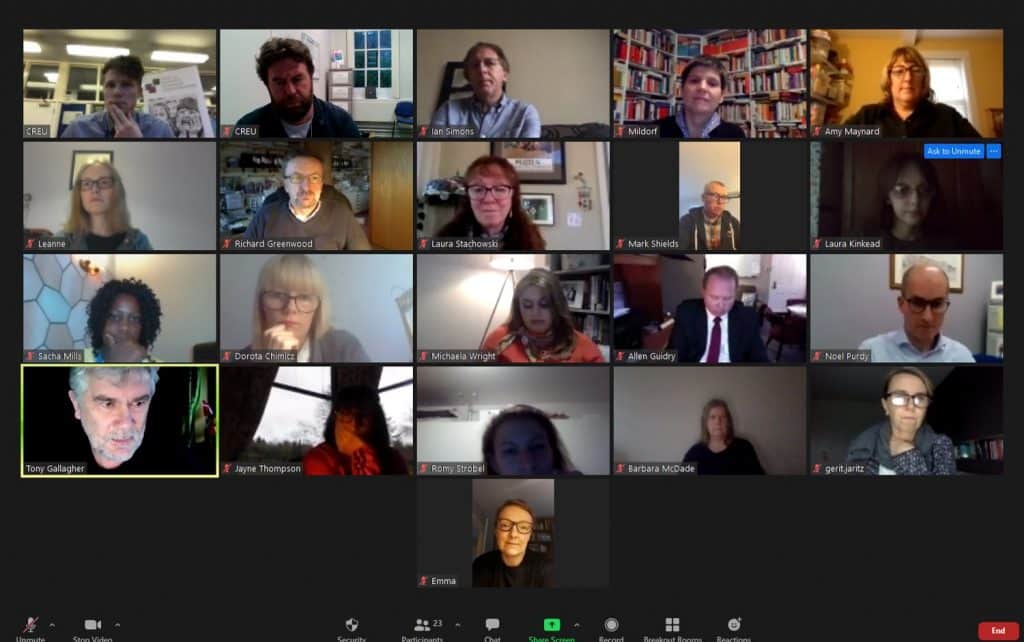International Perspectives on Educational Underachievement – Symposium Report
Usually at this time of year, Stranmillis University College plays host to a group of visitors from international partner institutions, for an enjoyable few days that include lots of friendly exchange about teaching and research. Instead this year, the year full of ‘first times’, we held an online symposium on “International Perspectives on Educational Underachievement”.

Although it was a pity not to be together in person this year, it was a great opportunity for us to connect with new colleagues and bring them into conversation with some of our local partners in Northern Ireland. It was a pleasure to welcome speakers from Poland, Antigua, North Carolina and Massachusetts, and participants from France, Poland, Germany, Norway, Austria, Denmark, Sweden and elsewhere.
Our theme was “International Perspectives on Educational Underachievement”. At CREU, we have focused our work on Northern Ireland, where the particularities of the economy, society, history and educational system necessitate a grounded and contextualized approach to understanding and reducing educational and socio-economic inequality. We are therefore keenly aware that as the socio-economic contexts and indeed education systems differ greatly between nations and sometimes regions, the problems faced as well as the approach taken by educational researchers will also vary.
However, internationally we as educationalists are united in a commitment to fairness in education. The OECD described fairness in education systems like this: Education systems are fairer if students’ achievements are more likely to result from their abilities and factors that students themselves can influence, such as their will or effort, and less fair the more they are conditioned by contextual characteristics or “circumstances” that students cannot influence, including their gender, race or ethnicity, socio-economic status, immigrant background, family structure or place of residence. There is so much we can learn from one another about how to go about achieving a fairer education system for our societies. Below is a brief summary of the talking points from each presentation.
First, Dr Allen Guidry of East Carolina University (USA) shared his recent work tracing the links between historic slavery and modern-day inequalities in some of the poorest counties in the United States, those served by his University. Though in its very early stages, his research suggests a geographical relationship between counties with high enslaved populations in the mid-19th century and a contemporary barrier to accessing higher education. This barrier comes in the form of a requirement for teacher recommendations and parental waivers to allow students to progress to higher level college courses.
Next, a collaborative presentation by Dr Amy Maynard of Lasell University (Boston, USA) and Antiguan teacher Sacha Mills outlined the ‘shoulder to shoulder’ partnership they have developed over the past six years. This multifaceted international exchange focused on classroom learning, teacher education and early literacy development, and with student teachers from Lasell travelling to Antigua and Antiguan teachers visiting in return. During the pandemic, online collaborations have intensified, with Sacha Mills creating a teaching website and Lasell student teachers developing online teaching materials and lesson plans to contribute to it.
After a short break, Dr Dorota Chimicz of UCMS Lublin (Poland) shared about her work on a recent large-scale survey with parents and teachers regarding wide-ranging reforms to the school system, and the question of inclusion within that system. A wide variety of attitudes towards SEN pupils, and provision for those pupils, pointed to various difficulties and irregularities in the process of supporting students with SEN in Polish mainstream schools.
Finally, we heard from Dr Noel Purdy in his capacity as chair of the ministerial Expert Panel to Tackle Educational Underachievement. Though the work of the panel is still in its early stages, Dr Purdy outlined how the panel was going about gathering evidence from across Northern Ireland, including regional days, written and oral evidence, parental perspectives and consultations with children and young people.
The event ended with wide-ranging discussions in smaller break-out groups and a final open forum. Three broad questions emerged at the end: firstly, should there be a resource or repository of ‘what works’ at the school and classroom level to improve outcomes for the most disadvantaged?; secondly and relatedly, what kind of changes are needed at the systemic and structural level to reduce educational inequality, rather than putting the onus on schools and teachers?; and thirdly, in light of the current pandemic, should large-scale external assessments go ahead? Input from international partners was particularly helpful on this point, as some countries had already pressed ahead with examinations despite the pandemic, whilst others had cancelled planned exams and put in place alternative arrangements.
Dr Jonathan Harris is the Research Fellow at the Centre for Research in Educational Underachievement
Reasons to study at Stranmillis
Student Satisfaction
Stranmillis is ranked first in Northern Ireland for student satisfaction.
Work-based placements
100% of our undergraduate students undertake an extensive programme of work-based placements.
Study Abroad
All students have the opportunity to spend time studying abroad.
Student Success
We are proud to have a 96% student success rate.
